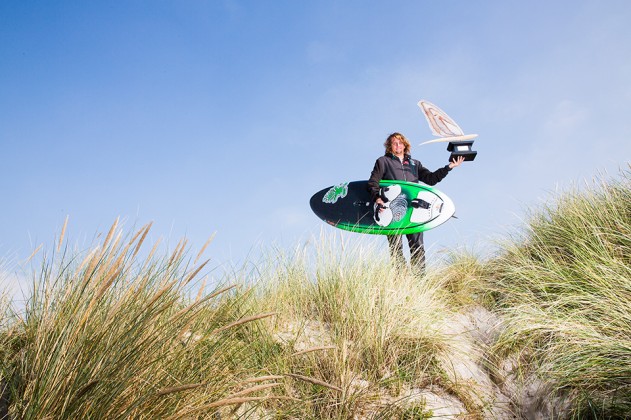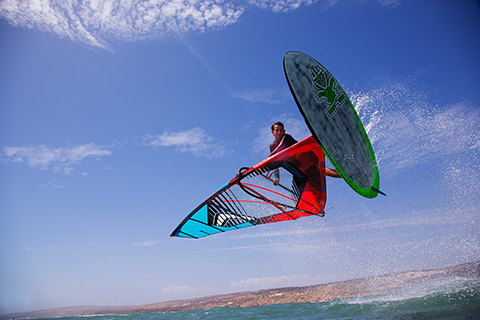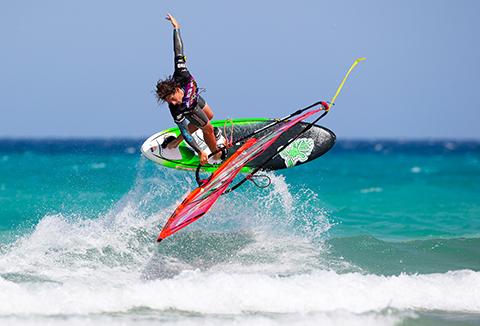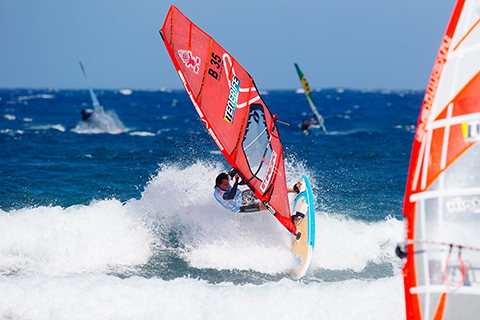DIETER VAN DER EYKEN – THE WINNING FORMULA!
The PWA freestyle crown has been dominated over the last decade by a handful of sailors. For 2015 a new name was added to the list, Belgian sailor Dieter Van Der Eyken. His victory came not only as a surprise to himself and the established ranks, but with an innovative and calculated approach to winning, drawing on his academic background. John Carter caught up with the freshly crowned World Champion at the final PWA freestyle stop in Sylt to learn more about his winning formula!
Words & Photo John Carter
JC: Out of the 150 sailors in Sylt this last ten days I guess you were the one guy that didn’t mind no competition.
DVDE: I’d love to have competed and earned the title but obviously that would have meant a risk that I could have lost it as well. I did not mind no wind (smiles). I’ll put it like this, Kiri lost it this way last year, in Sylt anything can happen, it’s a tough place to compete.
JC: Did you ever dream when you were first learning to freestyle that you might become the world champion?
DVDE: It was one of my goals and I hope to be able to do it again, maybe in some other disciplines as well. My original goal was to make my hobby my job and that is something that worked out already, four years ago. As soon as Steven won his world title I wanted one as well. We both grew up sailing together so I knew it was definitely possible. I did not expect it this year, I’ll be honest, but I have to say it feels pretty epic! Lifting the trophy was a highlight, just before I was called on stage my heart started pumping like crazy as it was a dream come true! It was really great to have my parents, sister and girlfriend there as well to celebrate the title and share the great feeling. Especially in Sylt with so many people watching the ceremony, it was extra special after waiting 10 days.
JC: Has the fact that you are world champion sunk in yet?
DVDE: The victory from Fuerteventura has only just sunk in and in the end that event made a massive difference. Last year I was fifth for the second time, so this year I just set out to sail solid heats. I just worked on the moves that I was good at and just tried to sail in those seven minutes like I know I can do in free sailing. I think I had a good mind set; I did not put too much pressure on myself and just took this year heat by heat.
“ I like to always try and start on the opposite tack to my opponents ”
JC: Any plans on what you’ll spend your bonus on?
DVDE: (Laughs) I already spent a part of it on a van in Australia. I’ll use the rest of the money to pimp it out a little so it’ll be more comfortable to stay in than my previous van over there.
JC: What’s going on in Belgium, that’s 2 world champions so far. Is it the chocolate, or is it the conditions?
DVDE: I don’t know to be honest. I think the main reason is because we don’t live right by the sea and we don’t have any thermal winds, so we are motivated to sail in any kind of conditions. Belgium is so diverse; we have many different spots with very unusual conditions. I guess we adapt really quickly and stay motivated no matter how cold or bad the conditions are.
JC: Did you grow up sailing with Steven Van Broeckhoven?
DVDE: Yeah, he lives one hour away from me but we both sail the same spot, Brouwersdam in Holland. He went out with my sister for quite a while so we ended up training together quite a lot. We travelled for about four years together. There was a whole crew from Brouwersdam that all helped each other, not just Steven. I think Davy Scheffers helped me a lot because we were a very similar level and both pushing each other. When we started doing the world tour we had a pretty high level straight away. That benefited Steven as well because he was trying to stay in front of the young guys. In the end two world titles have come from Brouwersdam, let’s see how many more can come!
JC: I heard you are quite a mathematician?
DVDE: I am pretty good with numbers, I think I am one of the smartest competitors in the freestyle fleet academically. I think in terms of competition I have figured out the system more than most of my rivals. I am probably not the best free sailor because when I sail with guys like Amado he does some moves that blow me away and that I can’t do yet, but I immediately know when I lose a heat why I have lost. I already know where I will be in the double in the seedings where most of the guys don’t have a clue. I have the judging and everything all analysed. Every event it changes a little bit what the judges want, so I go and look at the sheets after every single heat, even if I win or lose. In the first rounds I will always try a certain move, which I am not sure how it will score, so I go and check it. Even if I win easily I will still check the sheets. Like this you get a much clearer picture which moves the judges really like. You soon find out what moves count for more even if you think a certain move is tougher, if the judges are rewarding something else higher, then go with that. That helped give me the world title this year definitely!
JC: Do you have a set plan how you are going to build up your heats, with the hardest tricks coming once you have nailed a few basics?
DVDE: I have a routine, anyone at the top has a system of moves they execute. We know what score the most and we know what we are capable of! We also know that a lot of guys lose because they don’t know how the scoring works. Most of the time we get seven attempts on each tack at moves with the best three or four counting. After you have tried seven moves on one tack, then anything after that won’t count even if it’s the sickest move possible. Some guys repeat moves, or do their best moves after they have already done their seven. I like to always try and start on the opposite tack to my opponents. I don’t like to have another guy around me at the beginning of the heat. Most guys in Fuerte’ start their heats on the way in while I will always start on the way out. If it’s a four man heat I am the only one out of the four who can choose exactly where he does his move. For the first two minutes I just have to look at the gusts rather than look at the other guy!
JC: What do you think you would be doing if you were not a pro windsurfer right now?
DVDE: I would be finishing my studies in mechanical engineering and maybe have studied industrial engineering. I would still be sailing a lot! I have always loved sailing. I don’t know, I can’t even imagine not being a pro windsurfer. I love the life I am living now, you get very quickly used to it but at the same time I know I am really lucky to have this life.
“ When you hit the top ten it is all about who gets in the zone ”
JC: You spent a lot of time traveling in your van around Europe this summer, how did you enjoy that?
DVDE: I love travelling by van or by car, this spring I kitted out my van with my dad and I have spent about seven months living in it and other vans this year. That is how I grew up. Every weekend or during holidays I would go to the sea with my parents in their camper. We were always chasing the wind and this is still what I love the most. I hate flying with board bags, it is super expensive and always a hassle. This year I took my van to the Canary Islands, I arrived at the beach and I had everything there with me. It was so relaxing. In Fuerte for example I never slept in the hotel, even though we had free accommodation there. I would rather sleep in my own bed! Basically my van is now my home!
JC: Do you have any top tips for anybody planning to travel around in a van?
DVDE: Don’t plan anything! Just look at the forecast and chase the wind! You need to be flexible so don’t get your itinerary too set in stone. It is useful to research the countries you plan to visit to check how they are with free camping and make sure you have your own energy system. The van I have in Europe is pretty much self-sufficient, the only thing I have to do is put water and fuel into it (sadly enough).The fridge and heater work on solar energy, which comes from the solar panels on top of the van. If you do invest in kitting out your own van, don’t try to save on these essentials. My dad and I worked very hard on it for 6 weeks, day and night, but the result is amazing. I always dreamed to have a van I could travel in and now I have it. Always keep the places you go clean when you leave and enjoy the trip!
JC: How important have your parents been in helping you follow your passion?
DVDE: My dad taught me to windsurf and he has been sailing for twenty five years. If they can, they come to every contest which is great because it helps me to concentrate on my heats. I tell my dad in the morning what I want to do and he knows when to keep his distance. He is great support and he is always there for me. My girlfriend was also in the Canary Islands which was also really nice and having those people around me is a big help. One thing is the skills you have but the support is also important, plus the mental state you are in. That can decide these days whether you win or not.
JC: How have you been involved in the evolution of the Freek sail?
DVDE: I have been on Severne for more than ten years now. I always used the S1 for freestyle, which I really liked, but then in 2013 they decided to switch to the four batten concept to help make the weight lighter and improve the handling of the sail. At the time the S1 was winning all wave and freestyle tests so it did not really make sense to make two sails. I pushed for it and since it came out in 2013 I have been at the head of its development and talking to the team riders. I even helped Amado onto the team because he really liked the sails. This winter we will be testing together the new sails, so that will be exciting. I love the development and hope I can do it for a few more years.
JC: I guess that means a few trips to WA during the European winter, to test and train?
DVDE: Yes exactly, WA is a fixed trip in my calendar. It is not just because I need to be there to make the sails, it is my favourite place to sail during the winter. It is like my present I get at the end of a year of competing. Most riders would love to just go on trips all the time but they need the events to make money, get results and help attract new sponsors. It is the most fun time of the year for me. I love the way they travel in WA and living on the road in a van. It also boasts some of the best conditions ever. Being part of Severne is not just being part of a team, it is more like a family. I know Ben and all the guys so well now and how the company works. I don’t see me leaving Severne in the near future with or without this title. It’s a pleasure to work with them and I’ll be back every winter.
JC: So you have stepped into the waves this year as well as competing in freestyle?
DVDE: A lot of people are afraid to compete in two disciplines. Last year I only had three freestyle events and I knew I had to compete more. I knew my wave level was a decent standard so I decided to take it seriously, training and working hard for it this winter. It gave me a lot more hours on the water, less on the freestyle board than the wave board. It made me so much more motivated. Now I am doing nine events rather than three or four. The extra training in waves gave me an extra stoke about windsurfing and it was something I had lost a bit the year before. I feel more competitive and on my game I guess, there are not so many breaks between contests and it is a lot more fun.
JC: So I guess you have learned a few tricks from Jaeger and Scott McKercher in the waves?
DVDE: Jaeger has been my main influence in the waves. Every time I go to Australia I am located in Geraldton most of the time and I sail with him all the time. We know each other pretty well now, from all the riders on tour he is my favourite one. His wave riding is like surfing and that is what I like to see. As a freestyler, people tell me I can do all the tricks in the waves but I want to learn the proper turns. Then I want to learn to combine the turns with the tricks I know. I want to make my style look like surfing rather than doing a half bottom turn and a goiter off the lip. I want to do a proper bottom turn, hit the lip and then do my move. I think that has worked pretty well because I have been losing on my jumps and beating people in the waves. I’ll try to keep improving in my wave sailing as well and I’d like to make the top 16 next year. This year my aim was to make it through the trials and I’ve made it through a few heats as well. It’s very different to competing in freestyle but I do have an advantage because I sail so many contests during the year. I see new guys coming in who don’t know how it all works and so get all stressed. Their free sailing is amazing, but in their heats after five minutes they haven’t caught a single wave. Even if the wave is bad, you kind of need a score to at least have something on the sheets. I won’t stop wave sailing for at least another four years.
JC: How do you learn new moves?
DVDE: All the top ten freestylers are at a level where they know exactly how the moves work. They know what each movement does to your sail and to the rotation. There are some guys like Yentel for example who goes out and just tries a new move. I am probably the guy who does completely the opposite. I watch at least five clips, visualize the moves and when I see how it goes in my head, fully sure of the move’s mechanics, then I will try it. I kind of break it down systematically and probably land it within two or three attempts. I don’t know which way is the fastest to learn but I prefer my way because it is a bit less painful.
JC: What are your tips for regular sailors to learn new moves?
DVDE: Watch a lot of clips and find someone to film you. This is the most important part. You also need to film from different angles. The Go Pro’s are useful and give you another angle to watch what you are doing. It’s good to put your clip exactly next to other clips of somebody that can do the moves. Then you can see the difference and pretty much learn the moves yourself. So try and obtain footage and really put in the time to analyse it. There is also a lot of coaching available now and I really recommend going on a dedicated course to improve your sailing. If you have the money for this it does really help. I would advise every sailor to go to at least one clinic to help improve. I did it in the past myself as well. That is how I learned my first spocks.
JC: How did you get in the zone to beat Amado in Fuerteventura?
DVDE: When I lost the first final of the double elimination to Amado, I looked at the sheets and realized I had sailed his heat and not my own. Then I realized I could beat him and the event could be mine! I knew before the heat that I would win the event. I had sailed a quick warm up and landed every single move. I said to myself, ‘this is your chance, whatever happens in the heat, fight until the last!’ In the deciding heat against Amado, I won the heat in the final minute, he was leading until that moment. I nailed two more counting moves and that made the difference. Fuerte’ taught me a lot mentally and in the end that is what makes the difference. When you hit the top ten it is all about who gets in the zone. Being smart helps as well! It is not just about the skills, there is a hell of a lot more involved and that is why Gollito has six world titles whereas Kiri for example always misses out because he still has not figured out the system.
JC: Maybe you should teach him?
DVDE: Or not! (Laughs)
JC: So how do you see the future panning out?
DVDE: I am just 23 and I still have a long career ahead of me. At the end of last year I quit my studies because it was too hard to combine with life as a pro. I decided then that I would commit to windsurfing for at least another five years until I am twenty seven. At that point I will decide if I will go back to my studies. If I am still in world title contention I will continue doing the world tour. It also depends if I find an outside sponsor and how the world tour grows. If it grows to six or seven freestyle events and similar wave events then it is a whole different story. Right now I have dedicated four years to the world tour and I guess I’ll review it when the time comes. At 27 I can still do anything I want. I have a world title at 23 now and I hope that will open up some doors. I think this title will help me a lot. Second is ok, but a title will always stick to your name. That year is mine, it has been a massive achievement for me and it is something I could have only dreamed of and now it is reality. I spent six years on tour and now I have won a title, it has been an amazing year. I had never been on the podium until Fuerteventura and I won the event in the most spectacular way I could. I beat Kiri, beat Amado twice and really stamped my name on the event. In the end, that event decided the world title.
JC: How do you plan to defend your title?
DVDE: Every year the level gets higher and higher. There are so many guys now who could grab the world title. I will have to catch up on moves like the Shifty, but I want to keep evolving in my own way in freestyle, rather than looking at the rest. That’s what I did this year and it seemed to pay off. Competing is more than just who’s the best freestyler, a lot of the time it comes down to the consistency and the mental power of the rider too. Training with Amado in Oz will definitely help evolve my freestyle in new ways, especially the double air rotations; this is what I want to push for in the future!




